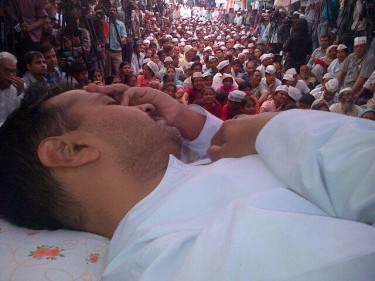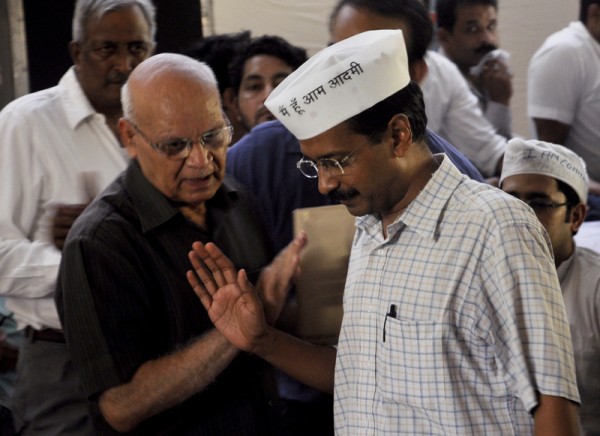Five days into his fast in protest of hiked utility prices, Indian anti-corruption activist Arvind Kejriwal was announced as a contender for the 2013 TIME 100 Poll [1], an annual list of the 100 most influential people in the world. Kejriwal's nomination for the list prompted an outpouring of enthusiasm from his supporters.
Kejriwal's fifteen-day fast [2], which lasted from March 23 to April 6, 2013, was in protest against the unfair rise in electricity and water prices in Delhi. Kejriwal spent his fast in Delhi’s impoverished neighborhood Sundar Nagari, where many of the residents had received electricity bills disproportionate to their actual use.
In late 2012, Kejriwal had launched an anti-corruption political party called Aam Aadmi Party [3] (AAP, or “Party of the Common Man”). During Kejriwal's fast, AAP volunteers collected signatures from people pledging not to pay their inflated electricity bills; by the end of Kejriwal's fast, over one million people had signed AAP's petition [4]. The consensus letters are due to be submitted to Delhi Chief Minister Sheila Dixit [2] for the second time on April 28, 2013.
 [5]
[5]Arvind Kejriwal on the 15th day of his fast in Delhi's Sundar Nagari. Photo: Manish Sisodia, Member Aam Aadmi Party. Used with permission
The activist-turned-politician called this movement “Civil Disobedience [6].” One of the main purposes of his fast was “to remove fear from the minds of Delhi's citizens” [7], as many people in India are believed to be afraid of raising their voices against corruption. According to Kejriwal, the unfair rise in electricity prices and the inflated electricity bills were the results of corruption led by a corporate-political nexus.
For many, the impact of Arvind Kejriwal's fast and his recognition by TIME magazine were reflective of his growing influence in India’s political discourse. Those who have been following Kejriwal's past as a social activist emphasized that Kejriwal was not an overnight hero. For instance, one of his significant contributions as an activist was the campaign to establish the Right To Information (RTI) Act in India [8], which was passed by the Delhi Assembly in 2001 and was eventually passed by the Indian parliament in 2005. Today, the RTI Act is used by many activists in India to keep tabs on corruption in government offices.
The Delhi-area blogger Aditya Pranav highlighted Kejriwal's previous contributions, writing on his blog [9] on April 12:
Some people believe that Arvind Kejriwal has turned into a crusader overnight. It is a must watch video [10] [hi] for them for they would then realize that the movement they are now seeing has been evolving for many years. This was about the taxpayer’s money being looted in the name of various urban developmental activities shown on paper with very little or nothing being done actually. You would see how they went on to organize a first Jan Sunwayi or public hearing of its kind wherein thousands of people including locals, journalists, MLA, Mayor and people from various social organizations gathered.
The 2013 TIME 100 Most Influential poll was open for voting from March 28 to April 12, 2013. During the voting period, the enthusiasm among Kejriwal's social media supporters was noteworthy. According to the poll results [11], Arvind Kejriwal received 91.51% positive votes. By the end of the TIME 100 voting period, a total of 124,769 people had voted on Arvind Kejriwal, with only 8.49% of the voters rating him as not influential.
Young people appeared more appreciative and fearless in expressing their opinions online. On April 11, Ishwar Kandpal (@ishwarkandpal [12]) [hi], a self-proclaimed supporter of Kejriwal and the AAP, tweeted [13] to the Prime Minister's Office [14] (PMO) of India:
मुझे गर्व है अरविन्द केजरीवाल ने विश्व भर के चुनिन्दा 100 लोगो में जगह बनाई !
I feel proud that Arvind Kejriwal has made a mark among the 100 most influential people in the world.
On March 28, another AAP supporter, Somu Kumar (@adivasi [15]), opined [16] that voting for Kejriwal was equivalent to voting for anti-corruption in India:
A vote for Arvind Kejriwal in 2013 #TIME100 list is a vote for India's anti-corruption movement. Please vote!
The Indian news media was not spared from criticism: an AAP supporter writing under the name of Bharat Builder (@bharat_builder [17]) chided the Indian media [18] for not recognizing Arvind Kejriwal’s work. He tweeted on April 12:
Listen Indian media, Arvind Kejriwal and decentralization is the idea whose time has come. @Time knows it, you don't!
 [19]
[19]Anti-corruption activist Arvind Kejriwal took the plunge into electoral politics, promising to give the country a party of the people. Image by Rohit Gautam. Copyright Demotix (2/10/2012)
AAP supporter Jyoti Shankar Jha (@Jyotishankarjha [20]) [hi] was rather sarcastic in calling for those on Twitter to vote for Kejrawal. On April 11, he wrote [21]:
मत देना अरविन्द को वोट TIME के इस पोल में रिश्वत नहीं लेता,एक भी दंगा नहीं करवाया,ना मारपीट करवाई. फिर क्यों दे वोट ?
Please don't vote for Arvind Kejriwal – he doesn't take bribes, he has not participated in a single riot, nor has he ever incited people to be violent.
However, there were some who felt that India, given its population size, could have done far better in supporting Arvind Kejriwal in the TIME 100 poll. Another of Arvind Kejriwal's supporters, Hemant Verma (@hemantverma007 [22]), opined [23]:
We are 1250000000 Indians and we don’t have 1250000 vote Arvind Kejriwal
Other bloggers noted that inclusion in the TIME 100 poll is only intended to measure a person's influence. Freak-o-litics [24], a “political junkie” blogger who discusses Indian politics, wrote in an April 9 post:
One important thing to keep in mind is that these candidates chosen are simply the most influential people in the world but doesn’t necessarily mean in a positive way – as Time clearly points out: Although appearing on the list is frequently mistaken as an honor, these sets of people are recognized for changing the world, for better or for worse.
Interestingly, there have not been many Indian political leaders featured in previous TIME 100 polls. In 2012, Gujarat CM Narendra Modi was one of the hopefuls. However, he attracted more negative votes than positive votes [25].
The voting for the The 2013 TIME 100 Most Influential poll is now closed, and the final list is expected to be released on April 18, 2013.
This post was proofread in English by Molly Allison-Baker [26].